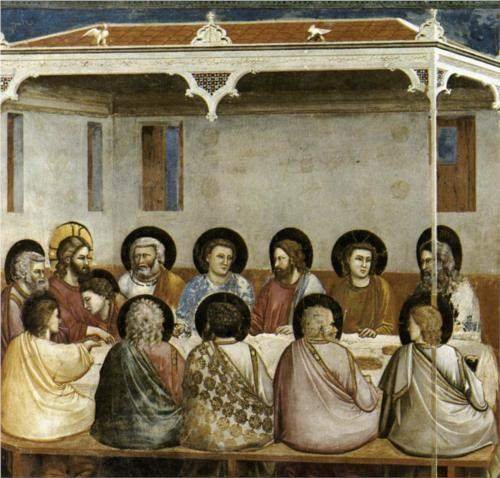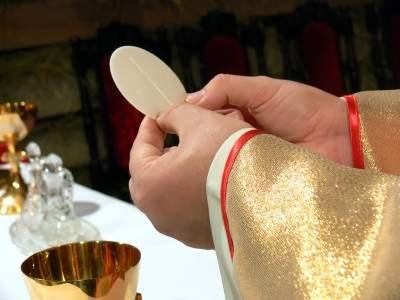
Every week when my parents get home from their church and I get home from my Mass, they ask me “how church was.” Growing up Protestant, this was a common way of talking. “Church sure was good.” “That was a good service.” Just yesterday, they came home telling me how “good” their church was. Now, as a Catholic, I’m struck by how foreign this mode of speech has become, and I’m never quite sure how to respond.
They mean, of course, that the sermon was good, edifying or inspiring, or that the worship was stirring or emotional. Which are good things. That’s why Protestants go to church — to hear good preaching, or experience good worship, or have good fellowship.
But that’s not why Catholics go to Mass. We go to Mass for the Eucharist — to partake in the intimate communion of Holy Communion; to share in the Body and Blood, Soul and Divinity of Jesus Christ; to receive Him in person, in our person and in His person. And that is always good — beyond good; it is divine.
So asking a Catholic if “church was good” is like asking if Jesus is good. Why yes, of course it was good. The homily could have been dull, and the music could have been grating; but Jesus was there in the Eucharist. He came to meet me, to touch me and be with me. How can that be anything but good, wonderful, awesome, overwhelming? Evangelicals like to brag that their faith is not a religion, but a relationship, and yet they only experience Christ in the abstract in their services, through their singing and someone else’s preaching.

It strikes me, too, that I never really understood what “Communion” was about as a Protestant. Who is it that we were supposed to be having “Communion” with, and in what way? I guess many Protestants think of it as a meal in common, a symbolic gesture of unity, a sign that the church is together in following and serving the Lord. They are sitting down to a meal, symbolically, with each other and with Jesus. But the very term Communion evinces something much deeper and more intimate, and I can now see why many Protestants shy from it, calling it instead only the Lord’s Supper. But St. Paul himself testifies to what it is:
The cup of blessing that we bless, is it not a communion [Greek κοινωνία (koinōnía), often translated participation or sharing] in the blood of Christ? The bread that we break, is it not a communion in the body of Christ? Because there is one bread, we who are many are one body, for we all partake of the one bread.
(1 Corinthians 10:16–17)

Yes, got it in one my friend. It is He who we encounter at the Eucharist who makes all things – even us – good 🙂
Yes, absolutely. Even when I’m struggling, when I’m falling, He comes to meet me and sets me back on my feet.
You capture so well why so many of us go to church – and why we find that question – ‘how was church?’ so hard to answer. I’m never brave enough to say: ‘God was the same, He was last week and will be next week.’
That is a really good answer, too. 🙂 “God is the same, yesterday, today, and forever.” (Hebrews 13:8) We used to always say that in my church growing up, but I never quite understood it. If God is always the same, why does He sometimes feel so far away? Where is He when I’m feeling crappy? If only I’d understood that it was true whether I felt it or not; if only I could have come to Him in His fullness.
Yes, that’s so true. He’s always there – it is we who are absent too often.
Being a nerdy convert, I answer the question “How was Church?” with “Awesome”. Because it is. Always.
I should start doing that. I’m always a little confused for a moment before answering, “It was good.” (And thinking, You wouldn’t be asking if you really understood.) I’m glad somebody else finds this a strange question. 🙂
Communion in my Church happens once in three months. The reason for it not being held every Sunday? I’m not sure of. Yet. But in my humble Opinion Richard, there will always be a section of people who attend the Communions without truly understanding what it represents and stands for. Catholics as well as Protestants. The standard answer , “Church was good” is commonly thrown around and I appreciate your insight here 🙂
God Bless.
Many, many Protestants neglect the Eucharist. That’s something I don’t understand either and want to write about in this series; thanks for reminding me how pressing it is. You are right that even many Catholics take the Eucharist for granted, and don’t think about what it is, Who it is, they’re receiving, and cherish what an awesome gift it is. Thanks for the comment; God bless you, too.
* make that Joseph. Mistake! :O
No problem. It’s one I’m used to. 😉
Thank you for this. I became a believer at a time when the church I was attending had a special “focus” on Communion. It’s always held a special place for me, and the fact that the church I attend only observes it once a quarter definitely saddens me. I know Protestant churches’ doctrines say they view it as a “Sacrament” but the lack of holiness that accompanies its observance is something that I think will always sadden and convict me. All I can do is know that, in my heart, I am truly meeting with the Lord Christ in my observance of Communion with Him. I wish with all my heart that I could observe it corporately every time I am with the larger body.
On a second note, the question “how was church” is something I got/still get asked a lot. And I still ask it of other people. “What did you think of the sermon?” “Did it help you out?” etc. I never knew what to say, other than “good” or “eh, it was boring” or “man, that really didn’t apply to me…” Thanks for getting me to think about how I view the corporate worship service. I don’t want to just say it was good or boring based on how I am feeling on any given day or with any given service. The point of a worship service, for me, is to be there to worship God with my fellow brothers and sisters in Christ. Whether or not I particularly like the sermon or music that day shouldn’t be of importance.
Obviously, I’m convicted by your thoughts, as I typed a pretty lengthy response.
I enjoy your posts!
I’m always glad for lengthy responses. Thank so you much for reading and commenting. 🙂
I’m glad you were introduced to Communion early in your walk — it is so crucial to who we are as Christians. I don’t know what kind of church you’re a part of, but most evangelical Protestants don’t view Communion as a sacrament, at least not in practice. Most see it merely as a symbol. It’s only Anglicans, Lutherans, Methodists, and some Presbyterians, I think, who have any sense of the Eucharist being a sacramental part of Christian life. I’m going to be writing soon on why Protestants have pushed it away.
Our relationship with God is definitely not just about feeling. That’s something I struggled with my whole young life, and it wasn’t until I was becoming Catholic that I really, fully understood. There’s nothing wrong with Protestants valuing preaching or worship or fellowship — they are definitely good things. My point was that Catholics don’t tend to value those in the same way; they aren’t the reason for going to church. You’re right that we have to think about why we’re coming together. I thought and wrote about it so much in wanderings — is it for fellowship? support? teaching? preaching? — and all those things I thought I was looking for, it turned out weren’t the most important thing.
I think you would find this humourous: I was at a Catholic retreat a few weekends ago (something I will probably be posting about soon!). The topic was Flannery O’Connor and Walker Percy and led by Angela Alaimo O’Donnel and I just couldn’t pass it up, even if it meant I was the only Protestant there… I asked a gentleman who went to the Saturday evening Mass “How was the Mass? Was it good?” He just looked at me, and went “uh… it was Mass.” He didn’t know what to say! It reminded me of this post and on how Protestants always ask if church was good.
That’s awesome. 🙂 I look forward to reading about your retreat. Poke me if you post about it (or have already posted about it) and I don’t respond. I’m up a swamp with my thesis these days, and fighting to occasionally pop in for air now and then.
I certainly will! Good luck on your thesis, I will pray for you to have focus!
Thank you so much, Faith.
Sometimes it’s important for church to be “good”. The Eucharist is a big part of why it -is- good.
Oh, there’s nothing at all wrong with it being good in other qualitative ways. My point was mostly is that Catholics (at least I don’t, and I’m aware that I’m abnormal) don’t think much about preaching or worship and whether it was good in deciding if church is “good.”